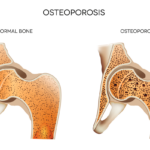During ACR Convergence 2023, experts discussed developments in the treatment and diagnosis of osteoporosis, addressing risks of treatment discontinuation, the use of bone turnover markers in patient assessment and vitamin D.


During ACR Convergence 2023, experts discussed developments in the treatment and diagnosis of osteoporosis, addressing risks of treatment discontinuation, the use of bone turnover markers in patient assessment and vitamin D.

The ACR recently released an update on the prevention and treatment of glucocorticoid-induced osteoporosis.1 The guideline, which includes information on the new therapies abaloparatide and romosozumab, emphasizes the importance of shared decision making by patients and clinicians, and also gives information on the importance of sequential therapy after stopping certain osteoporotic prevention therapies. Fracture Prevention…

In late December, the FDA approved subcutaneous abaloparatide for the treatment of men with osteoporosis at a high risk of fracture. This approval is based on a placebo-controlled study that showed abaloparatide led to significant increases in bone mineral density of the lumbar spine, total hip and femoral neck. Abaloparatide was approved in April 2017 for the treatment of postmenopausal women with osteoporosis at high risk for fracture.

A study from Amigues et al. found that bisphosphonate-associated osteonecrosis of the jaw is rare in patients with osteoporosis and may occur more often in patients treated with injectable zoledronic acid than in those treated with the oral bisphosphonates.

ATLANTA—The ACR released a summary of its updated guideline for the Prevention and Treatment of Glucocorticoid-Induced Osteoporosis in September. Many patients take glucocorticoids for a variety of inflammatory conditions, and anyone who is taking glucocorticoid medications and has other risk factors for osteoporosis increases their risk of developing glucocorticoid-induced osteoporosis. New osteoporosis medications and new…

Using three complicated patient cases, Kenneth G. Saag, MD, MSc, shared his expertise on osteoporosis and walked through his thought process and the literature, during a session of the 2022 ACR Education Exchange.

ACR CONVERGENCE 2020—Bisphosphonates are an important treatment for millions of older Americans with osteoporosis because the drugs inhibit osteoclastic bone resorption to reduce the risk of painful, debilitating fractures.1 More than 20 years ago, data emerged that bisphosphonates have a long terminal half-life.2 So after years of therapy, could some patients take a drug holiday?…

In a clinical trial, researchers compared the efficacy of abaloparatide with alendronate in reducing the risk of fracture among postmenopausal women with osteoporosis. The findings suggest initial treatment with abaloparatide may result in greater vertebral fracture reduction than alendronate…
Lisa Rapaport |
(Reuters Health)—Patients hospitalized for a hip fracture are less likely to experience a subsequent fracture-related hospitalization if they start anti-osteoporosis medication sooner, a Taiwanese study suggests.1 Researchers examined data on 77,930 patients aged 50 years and older hospitalized for hip fractures, including 9,986 people prescribed anti-osteoporosis medications within one year of the index fracture. Compared…

ATLANTA—Osteoporosis in premenopausal women is uncommon compared with its frequency in post-menopausal women, but when it is suspected, it poses some difficult questions for clinicians: How should it be diagnosed in this understudied population? If found, should it be treated—and how? Elizabeth Shane, MD, professor of medicine at Columbia University and attending physician at New…